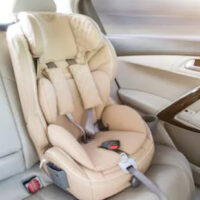Child Car And Booster Seat/Restraint Laws In Florida

Children cannot make decisions for themselves regarding their safety. Therefore, it is up to states to enact laws to ensure parents and caregivers take necessary steps to protect their children in case of an accident. As a Florida parent or caregiver, it is crucial for you to understand the Florida laws concerning child restraint systems because the child car seats and booster seats laws in Florida are designed to reduce child injuries and deaths from motor vehicle accidents.
Florida’s Child Car and Booster Seats/Restraint Laws
Under Florida law, child restraint devices should be used by all children riding in a vehicle under 18. According to the FLHSMV;
- Children aged five and below need to be secured properly in federally approved, crash-tested child restraint devices.
- Children aged between zero and three should be in a restrained carrier or a built-in child seat.
- Children aged four and five should be in a separate carrier, booster seat, or integrated child seat.
- The best seat for a child is the one that fits them, fits your car, and is used correctly every time you drive.
Failure to follow the laid-down rules could result in fines and points against the supervising adult’s driver’s license. Also, failure to follow the rules could result in serious child injuries or, worse, death.
Some Recommendations for Child Restraint Systems
Since Florida law does not give direct guidelines about the usage of rear-facing and front-facing car seats, you can refer to the recommendations given by the National Highway Traffic Safety Administration (NHTSA) and the American Academy of Pediatrics (AAP). For example, the AAP advises parents to ensure children under two years of age and most children up to the age of four ride in rear-facing car safety seats up to the limits of the car safety seat. According to the NHTSA, rear-facing car seats are the best for young children. When it comes to a forward-facing car safety seat, the AAP recommends using this type of car seat only after your child exceeds the height and weight limits of the rear-facing car seat. Once a child has been turned around, they should remain in a forward-facing car safety seat up to the seat’s length and weight limits. According to the AAP, most seats can accommodate children up to 60 pounds or more.
Children should only start using seat belts when they are large enough to use the vehicle seat belt alone. Until then, children who cannot use either the rear-facing or forward-facing car seats should use belt-positioning booster seats.
Contact Our Jacksonville Personal Injury Attorneys
If, after doing your best to keep your child safe, your child gets injured, or worse, killed in a motor vehicle accident because of another party’s negligence, you should know that you are not alone. Our Jacksonville personal injury attorneys at The Pendas Law Firm can help you determine your legal options. We can help you file a personal injury claim or a wrongful death claim against an at-fault party and obtain maximum compensation. Contact us today to schedule a consultation.
The Pendas Law Firm also represents clients in the Tampa, Fort Myers, Fort Lauderdale, Miami, Bradenton, Daytona Beach, West Palm Beach, Ocala, and Orlando areas.
Resource:
flhsmv.gov/safety-center/child-safety/safety-belts-child-restraints/






